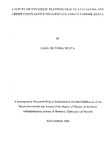| dc.contributor.author | Nguta, Greg M | |
| dc.date.accessioned | 2012-11-13T12:35:19Z | |
| dc.date.available | 2012-11-13T12:35:19Z | |
| dc.date.issued | 2009 | |
| dc.identifier.uri | http://erepository.uonbi.ac.ke:8080/handle/123456789/5101 | |
| dc.description.abstract | The purpose of the study was determine the strategic planning practices in Saving and Credit Cooperative Societies in Nairobi, Kenya. Chapter one contains the background information concerning the study. Strategic planning is discussed in this chapter. The objective of the study was to determine the strategic planning practices of SACCOs in Nairobi. The Research question was What are the strategic planning practices of SACCOs in Nairobi?
A survey design was used for the study so as to collect data from a large number of respondents. The population of interest was all the Savings and Credit Cooperative societies in Kenya. A sample of 50 SACCOs was used for the study. The targeted respondents were the General Managers and the Central Management Committee members of the SACCOs who are directly involved in strategic planning of the SACCOs .
The findings of the study indicate that strategic planning has been embraced by SACCOs of diverse ages and sizes. The findings of the study show that most of the SACCOs in Nairobi practice formal strategic planning. All the 38 SACCOs (100%) that responded to the research questionnaire indicate that they have developed a vision and mission statement. The General Manager being the CEO of the SACCO plays a key role in strategic planning whereas the Central Management committee which is equivalent to the Board of Directors of any other organization and also are representative of the members take a leading role strategic planning of the SACCO.
The study findings also show that the majority of strategic plans are of medium term with 42% of the respondents indicating that plans cover a period of 1 to 3 years. 32% of the respondents indicated that the plans cover periods of 5 years and above. All the SACCOs acknowledge that there are various challenges in strategic planning and implementation. Inadequate resources, inadequate training and shortage of qualified staff and political legal factors where identified as posing great challenges to strategic planning and implementation. However the SACCOs are responding to some of those challenges posed by environmental changes through a number of ways. Some of the responses include diversification of loan products, improving management information systems and opening up the common bond of the SACCO in order to attract more members. | en_US |
| dc.language.iso | en_US | en_US |
| dc.publisher | University of Nairobi, Kenya | en_US |
| dc.title | A Survey of Strategic Planning Practices in Saving and Credit Cooperative Societies (Saccos) in Nairobi, Kenya | en_US |
| dc.title.alternative | Thesis (MBA) | en_US |
| dc.type | Thesis | en_US |

